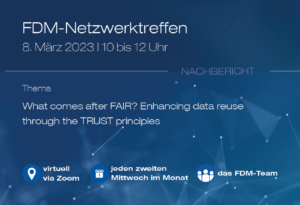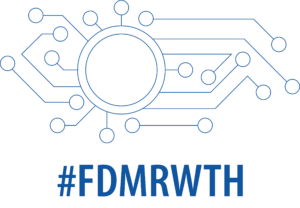
Quelle: Eigene Darstellung; Freepik
Am 8. März 2023 war es wieder so weit: Die Data Stewards, FDM-Verantwortlichen und FDM-Interessierten der RWTH Aachen trafen sich zum regelmäßigen offenen FDM-Netzwerktreffen online via Zoom. Gegenstand des Meetings waren die TRUST-Prinzipien und wie diese die Wiederverwendung von Forschungsdaten verbessern können.
FDM-Speed-Dating zum Kennenlernen
Das virtuell stattfindende Meeting wurde mit dem inzwischen etablierten FDM-Speed-Dating eröffnet. Im Rahmen kurzer Breakout-Sessions tauschten sich die Teilnehmenden in Kleingruppen über die Wiederverwendung von Daten und ihre besten Datensätze aus.
Vortrag: What comes after FAIR? Enhancing data reuse through the TRUST principles
Soo-Yon Kim arbeitet als Data Steward im Exzellenzcluster Internet of Production und berichtete aus ihrer Perspektive, wie die TRUST-Prinzipien über die FAIR-Prinzipien hinaus die Wiederverwendung von Forschungsdaten verbessern können.
Die FAIR-Prinzipien dienen den Forschenden als Leitlinie für die Aufbereitung und Dokumentation ihrer Daten zwecks optimaler Nachnutzbarkeit für Mensch und Maschine. Diese sollten, wenn sie erfolgreich angewandt werden, interessierten Parteien theoretisch die Möglichkeit geben, Daten zu finden, zu beziehen und einfach zu nutzen. Und obwohl die Nachnutzung von Forschungsdaten viele Vorteile (Kostenreduzierung, größere Datenbasis, neue Kooperationen etc.) für die Forschenden verspricht, besteht zwischen der möglichen und tatsächlichen Wiederverwendung eine Kluft.
Um diese Kluft zu überwinden und von der theoretischen Möglichkeit zur tatsächlichen Wiederverwendung von Daten zu gelangen, spielen weitere Faktoren eine Rolle, die über die FAIR-Prinzipien hinausgehen und mit den TRUST-Prinzipien adressiert werden.
TRUST-Prinzipien:
- Transparency: Leistungsumfang, Richtlinien und Zielgruppe der Nutzenden wird transparent und verständlich kommuniziert
- Responsibility: Verpflichtung zur Verwendung gemeinschaftlich standardisierter Formate, sofern vorhanden; Überprüfung der Authentizität der Datensätze
- User Focus: Berücksichtigung der disziplinspezifischen und individuellen Bedürfnisse der Datennutzenden
- Sustainability: Der Datensatz wird langfristig angemessen verwaltet
- Technology: sichere und langlebige Infrastruktur
Dabei richten sich die TRUST-Prinzipien insbesondere an die FDM-Infrastruktur und können bei der (Weiter-)Entwicklung nützlicher Dienste unterstützen. Gibt es z. B. Dienste für Interessierte, die bei der Selektion der verfügbaren Datensätze und der Bewertung ihrer Relevanz für die eigenen Zwecke helfen können? Wie können diese Dienste aussehen (möglicherweise Empfehlungssysteme für ähnliche Datensätze, Peer-Reviews, …)?
Die TRUST-Prinzipien geben eine Vorstellung davon, was Data Stewards, Forschungsdatenmanagerinneren und Forschungsdatenmanager sowie Repositorien-Betreibende tun können, um die Wiederverwendung von Daten über die FAIRifizierung, – der Prozess, um Daten FAIR zu machen – hinaus zu unterstützen. Somit können sie als eine Art Inspiration aufgefasst werden.
Interaktiv am Miro-Board
Im letzten Teil des Netzwerktreffens wurde es interaktiv. An einem vorbereiteten Miro-Board konnten die Teilnehmenden entlang der vier Stadien der Daten-Nachnutzung diverse Fragen anhand ihrer eigenen Erfahrungen mit der Datennachnutzung beantworten.
-
Initiierung
Es zeigte sich bei den ersten Fragen „Haben Sie schon einmal nach Daten gesucht?“ und „Sind Sie an der Wiederverwendung von Daten interessiert und in welchem Bereich?“, dass viele intern innerhalb eines Projektes oder des Instituts Forschungsdaten nachnutzen. Wichtigste Voraussetzungen für die Nachnutzung sind dabei z. B. die Vollständigkeit, Verständlichkeit sowie die Provenienz der Daten.
-
Entdecken und Beschaffen von Daten
Im zweiten Teil konnten sich die Teilnehmenden über die von ihnen meist genutzten Tools und Dienste austauschen. Dabei stellte sich heraus, dass die meisten nach Daten auf GitHub und Zenodo suchen. Es wurden auch weitere Lösungen wie FAIRSharing, Google Dataset Search und interessanterweise auch ChatGPT genannt. Bei den Fragen nach „Wie entdecken Sie Daten? Welche Tools und Dienste nutzen Sie tatsächlich?“ wurden die Verlinkung der Daten mit der Textpublikation sowie offene Datenbanken wie die Plattform academia.edu neben den bereits genannten hervorgehoben.
-
Verstehen und Auswählen
Bei dem Auswählen eines Datensatzes zeigte sich, dass den Teilnehmenden auf der einen Seite Aspekte wie Formate und offene Zugänglichkeit wichtig sind. Auf der anderen Seite wurden Aspekte wie ein vertrauenswürdiges Repositorium, die mehrfache Nutzung des Datensatzes in Publikationen sowie die Bekanntheit und Vertrauenswürdigkeit der Autorin oder des Autors als wichtig empfunden. Für das Verstehen eines Datensatzes sind bekannte Programmiersprachen wie Python sowie die Tools Wikidata und DBpedia von Bedeutung.
-
Prozess und Wiederverwendung
Bei der tatsächlichen Nachnutzung sind die folgenden Schritte typisch:
- Kontrolle: Ist der Datensatz lesbar, vollständig und sind alle Variablen und Werte vorhanden?
- Prozessierung: Formatkonvertierungen, Filtermöglichkeiten, Bereinigen des Datensatzes
Erfreulicherweise wurden schon einige Datensätze nachgenutzt. Dabei wurden Datensätze bevorzugt von Publikationen und GitHub Repositorien gewählt. Insgesamt zeigte sich bei dem Treffen, dass von den TRUST Prinzipien der Fokus auf der „Responsibility“ und dem „User Focus“ lag.
Das nächste Netzwerktreffen – Save the Date
Datum: 12. April 2023
Uhrzeit: 10 bis 12:00 Uhr
Ort: Konferenzraum UB (Raum 509)
Thema: networking@rwth BarCamp
Mehr erfahren
Wollen Sie ebenfalls ein Teil des FDM-Netzwerks an der RWTH werden, dann abonnieren Sie die Mailingliste „DataStewards@RWTH“.
Bei Fragen zum FDM-Netzwerk oder zum FDM im Allgemeinen schreiben Sie einfach eine Nachricht an das IT-ServiceDesk. Das FDM-Team freut sich auf Ihre Nachricht.
_______
Verantwortlich für die Inhalte dieses Beitrags sind Daniela Hausen, Sophia Nosthoff und Ute Trautwein-Bruns.





Schreibe einen Kommentar
Du musst angemeldet sein, um einen Kommentar abzugeben.